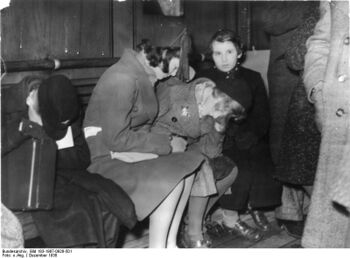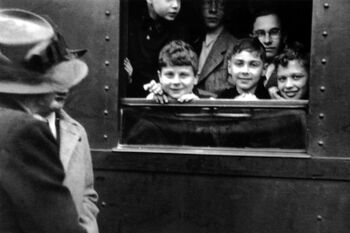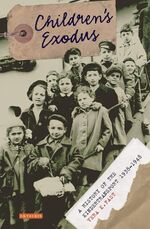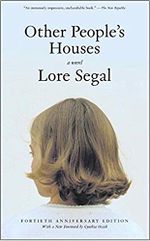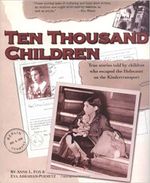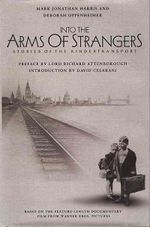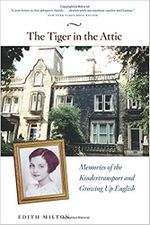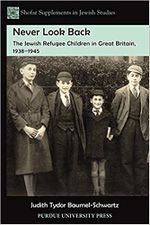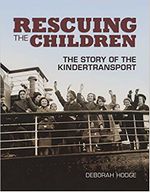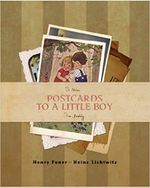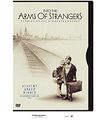Category:Kindertransport (subject)
Kindertransport (see Holocaust Children Studies)
Overview
"Kindertransport" was the name given to the mission which in 1938-39 took thousands of children to safety ahead of World War Two. It helped 10,000 unaccompanied children to escape from Germany, Austria, and Czechia to the United Kingdom.
There were Kindertransport also to other countries: France, Belgium, Netherlands, United States.
Bibliography
- Vera K. Fast, Children’s Exodus: A History of the Kindertransport (New York: I.B. Tauris, 2011)
- Judith Tydor Baumel-Schwartz, Never Look Back: The Jewish Refugee Children in Great Britain, 1938-1945 (West Lafayette, IN: Purdue University Press, 2012)
- Andrea Hammel and Bea Lewkowicz, eds., The Kindertransport to Great Britain 1938/39: New Perspectives (Amsterdam: Rodopi, 2012).
- Frances Williams, The Forgotten Kindertransportees: The Scottish Experience (London: Bloomsbury Academic, 2014)
- Iris Guske, Trauma and Attachment in the Kindertransport Context: German-Jewish Child Refugees’ Accounts of Displacement and Acculturation in Britain (Newcastle upon Tyne, UK: Cambridge Scholars Publishing, 2009)
Literature
1964
Other People's Houses (New York : Harcourt, Brace & World, 1964) is a semi-biographical novel by Holocaust survivor Lore Segal (Lore Groszmann; Austria, 1928).
KEYWORDS: <Austria> <Kindertransport>
"Originally published in 1964 and hailed by critics including Cynthia Ozick and Elie Wiesel, Other People’s Houses is Lore Segal’s internationally acclaimed semi-autobiographical first novel ... Nine months after Hitler takes Austria, a ten-year-old girl leaves Vienna aboard a children’s transport that is to take her and several hundred children to safety in England. For the next seven years she lives in “other people’s houses,” the homes of the wealthy Orthodox Jewish Levines, the working-class Hoopers, and two elderly sisters in their formal Victorian household. An insightful and witty depiction of the ways of life of those who gave her refuge, Other People’s Houses is a wonderfully memorable novel of the immigrant experience."--Publisher description.
1996
My Knees Were Jumping: Remembering the Kindertransports (1996) is a documentary, directed by Melissa Hacker.
"A Powerful account of an astonishing slice of Holocaust history, told with poignant intimacy by the daughter of a survivor. On the eve of WWII, Jewish children boarded trains taking them to refuge in London, many never to see their parents again."--Publisher description.
1996
Ein Kind unserer Zeit (Frankfurt am Main: dipa-Verl., 1996) is a memoir written by Holocaust survivor Ruth David (b.1929).
English ed. Child of Our Time: A Young Girl's Flight from the Holocaust (London: Tauris, 2002).
KEYWORDS: <Germany> <Kindertransport>
"Child of Our Time is the inspiring story of a little girl caught in the vortex of one of history’s great horrors. Plucked from deep rural Germany, after witnessing the horror of Kristallnacht and her family’s eviction from its village, Ruth David was sent to England as part of the Kindertransport—one of the few routes to safety and survival for many children who were to lose their parents in the Holocaust ... As a child of the Holocaust, David was one of the lucky ones: she was one of about 10,000 Jewish children who were taken by train to Great Britain and saved from death at the hands of the Nazis. "As a child I found it difficult to be grateful for this," she notes in a foreword to her own children. "I wanted to be with my family, wherever they were...." She was fortunate in another sense-her four siblings also survived the war. But David never saw her parents again after her departure for England: they perished in Auschwitz. She movingly describes her arrival in London, aged 10, part of a group of "tired, frightened children"; her gradual assimilation into the life of the hostel where she stayed; the strangeness of daily things such as corn flakes, which she had never seen before; up through the beginning of her new life when, at age 17, she left the hostel after the war. David notes she had never spoken about these events to her children. Readers will be glad she decided to share her moving experiences now."--Publisher description.
Ruth David (F / Germany, 1929), Holocaust survivor -- Born in Germany, Ruth L. David lived in England from 1939-1992 as a teacher of modern languages. She now lives in Ames, Iowa.
1999
Anne L. Fox and Eva Abraham-Podietz, Ten Thousand Children: True Stories Told by Children Who Escaped the Holocaust on the Kindertransport (West Orange, NJ : Behrman House, 1999)
Nonfiction <elementary and junior high school>.
"Tells the true stories of children who escaped Nazi Germany on the Kindertransport, a rescue mission led by concerned British to save Jewish children from the Holocaust."--Publisher description.
Anne L. Fox has written about her childhood in Nazi Germany and her subsequent departure to England with the Kindertransport when she was 12 years old.
Eva Abraham-Podietz is also a Holocaust survivor. She now lives in the U.S., and speaks primarily to school youngsters.
2000
Mark Jonathan Harris, and Deborah Oppenheimer. Into the Arms of Strangers: Stories of the Kindertransport (New York, NY, and London: Bloomsbury, 2000).
"Chronicles the events and people involved in the rescue of 10,000 children from Nazi territories, and what happened after the war. Official tie-in to the Warner Brothers documentary. First hand account of the extraordinary rescue mission of 10,000 children before the outbreak of World War II. For nine months before the outbreak of World War II, Britain conducted an extraordinary rescue mission. It opened its doors to over 10,000 endangered children, 90 percent of them Jewish, from Germany, Austria, and Czechoslovakia. These children were taken into foster homes and hostels in Britain, expecting eventually to be reunited with their parents. Most of the children never saw their families again. Into the Arms of Strangers recounts the remarkable story of this rescue operation, known as the Kindertransport, and its dramatic impact on the lives of the children who were saved. The book is the companion to the feature-length documentary which was released in the theatres by Warner Bros. in Fall 2000. It contains stories in their own words from the child survivors, rescuers, parents, and foster parents. They recount, in harrowing detail, the effects of the Nazi's reign of terror, the horror of Kristallnacht, the agonizing decision by the parents to send their children away, the journey, the difficulties of adjustment in Britain, the outbreak of war, and the children's tragic discovery afterward that most of their parents had perished in concentration camps. The stories are heartbreaking, but also inspiring. These are the stories of those who survived with the help of others; they are stories about the strength and resolve of children; and most astonishing, these are stories not yet heard about the Holocaust."--Publisher description.
2005
2012
Never Look Back: The Jewish Refgee Children in Great Britain, 1938-1945 (West Lafayette, IN: Purdue University Press, 2012) is a book written by Judith Tydor Baumel-Schwartz (b.1959).
"Between December 1938 and September 1939, nearly ten thousand refugee children from Central Europe, mostly Jewish, found refuge from Nazism in Great Britain. This was known as the Kindertransport movement, in which the children entered as "transmigrants," planning to return to Europe once the Nazis lost power. In practice, most of the kinder, as they called themselves, remained in Britain, eventually becoming citizens. This book charts the history of the Kindertransport movement, focusing on the dynamics that developed between the British government, the child refugee organizations, the Jewish community in Great Britain, the general British population, and the refugee children. After an analysis of the decision to allow the children entry and the machinery of rescue established to facilitate its implementation, the book follows the young refugees from their European homes to their resettlement in Britain either with foster families or in refugee hostels. Evacuated from the cities with hundreds of thousands of British children, they soon found themselves in the countryside with new foster families, who often had no idea how to deal with refugee children barely able to understand English. Members of particular refugee children's groups receive special attention: participants in the Youth Aliyah movement, who immigrated to the United States during the war to reunite with their families; those designated as "Friendly Enemy Aliens" at the war's outbreak, who were later deported to Australia and Canada; and Orthodox refugee children, who faced unique challenges attempting to maintain religious observance when placed with Gentile foster families who at times even attempted to convert them. Based on archival sources and follow-up interviews with refugee children both forty and seventy years after their flight to Britain, this book gives a unique perspective into the political, bureaucratic, and human aspects of the Kindertransport scheme prior to and during World War II."--Publisher description.
2012
Rescuing the Children: The Story of the Kindertransport (Toronto : Tundra Books, 2012) is a book written by Deborah Hodge.
"This important book tells the story of how ten thousand Jewish children were rescued out of Nazi Europe just before the outbreak of World War 2. They were saved by the Kindertransport — a rescue mission that transported the children (or Kinder) from Nazi-ruled countries to safety in Britain ... The book includes real-life accounts of the children and is illustrated with archival photographs, paintings of pre-war Nazi Germany by artist, Hans Jackson, and original art by the Kinder commemorating their rescue ... Discusses the efforts of the Kindertransport, which rescued ten thousand Jewish children from Nazi occupied countries before the start of World War II. "On December 1, 1938, a train carrying almost two hundred Jewish children pulled out of the station in Berlin, Germany. Just weeks before, the Nazis had burned down their orphanage. These young passengers were the first of nearly ten thousand children saved by the Kindertransport rescue mission. Learn why the children, called Kinder, were in danger in Nazi Europe. Read about the brave people who helped them escape to Britain and about the parents who gave their children a second life by letting them go. Get to know some of the Kinder by reading their moving accounts of heartbreaking farewells and long, often-perilous journeys to safety. Featuring archival photographs, paintings of pre-war Nazi Germany, and original art by the Kinder, this important book tells a compelling story about the power of compassion, bravery, and humanitarian action."--Publisher description.
The children's rescue -- Meet the children -- Terror in Germany -- Voices of the children -- Desperate times -- The night of broken glass -- Saving the children -- The Kindertransport -- Getting ready -- Saying good-bye -- The journey -- Arriving in England -- People who helped -- The SS Bodegraven -- Life in Britain -- The war years -- After the war -- The Kinder today -- Reunions -- Remembering.
2013
Postcards to a Little Boy: A Kindertransport Story (Jerusalem: Holocaust History Museum Yad Vashem, 2013) is a memoir written by Holocaust survivor Henry Foner (Heinz Lichtwitz; Germany, 1932).
KEYWORDS: <Germany> <Kindertransport>
"Henry Foner (Heinz Lichtwitz), who had lost his mother at a young age, was sent from Berlin to Wales and lived there with a Jewish couple, who provided him with a warm, loving home. From the moment they parted, Henry's father sent him colorful illustrated postcards written in German and later on in English. This authentic and moving document presents the postcards and letters that Henry received from his father and other relatives and friends, along with their translation."--Publisher description.
Henry Foner / Heinz Lichtwitz (Germany, 1932)
Films/Documentary
- All My Loved Ones (1999) -- feature film
- My Knees Were Jumping: Remembering the Kindertransports (1996) -- documentary
- The Children Who Cheated the Nazis: The Story of the Kindertransport (2000) -- documentary
- Into the Arms of Strangers (2000) -- documentary
- Nicholas Winton: The Power of Good (2002) -- documentary
- Holocaust Day: A Haven in Wales (2005) -- documentary
- Sel Hubert, Kindertransport (2011) -- video (12m)
- Kindertransport (2013) -- video (5m)
Child survivors
- Gerda Mayer (Czechia, 1927)
- John Grenville (Germany, 1928-2011)
- Karl W. Gruenberg (Austria, 1928-2007)
- Frank Marcus (Germany, 1928-1996)
- Isi Metzstein (Germany, 1928-2012)
- Michael Roemer (Germany, 1928)
- Joe Schlesinger (Austria, 1928-2019)
- Lore Segal (Austria, 1928)
- Guenter Treitel (Germany, 1928-2019)
- Ruth Westheimer (Germany, 1928)
- Yosef Alon (Czechia, 1929-1973)
- Ruth L. David (Germany, 1929)
- Geoffrey Hartman (Germany, 1929-2016)
- Hella Pick (Austria, 1929)
- Otto Decker (Germany, 1930)
- Walter Feit (Austria, 1930)
- Astrid Zydower (Germany, 1930-2005)
- Frank Auerbach (Germany, 1931)
- Renata Laxova (Czechia, 1931)
- Alf Dubs (Czechia, 1932)
- Henry Foner (Germany, 1932) <Memoirs>
- Edith Milton (Germany, 1932)
- Arno Allan Penzias (Germany, 1933)
- Steve Shirley (Germany, 1933)
- Fritz Bach (Austria, 1934-2011)
- Erich Reich (Austria, 1935)
- Eva Hesse (Germany, 1936-1970)
- Fred Rosner (Germany, 1936)
External links
Pages in category "Kindertransport (subject)"
The following 34 pages are in this category, out of 34 total.
1
- Bertl Rosenfeld / Bertha Esenstad (F / Germany, 1925), Holocaust survivor
- Heini Halberstam (M / Czechia, 1926-2014), Holocaust survivor
- Karel Reisz (M / Czechia, 1926-2002), Holocaust survivor
- Olga Levy Drucker
- Theo Engelhard (F / Germany, 1927), Holocaust survivor
- Heinz Landwirth / Jakov Lind (M / Austria, 1927-2007), Holocaust survivor
- Gerda Mayer (F / Czechia, 1927), Holocaust survivor
- Edith Rosenfeld / Edith Kaye (F / Germany, 1927-1998), Holocaust survivor
- Roselind Baum / Roselind Berlinger (F / Germany, 1928), Holocaust survivor
- Lilly Cohn / Lillyan Rosenberg (F / Germany, 1928), Holocaust survivor
- Vera Diament / Vera Gissing (F / Czechia, 1928), Holocaust survivor
- John Grenville (M / Germany, 1928-2011), Holocaust survivor
- Karl W. Gruenberg (M / Austria, 1928-2007), Holocaust survivor
- Frank Marcus (M / Germany, 1928-1996), Holocaust survivor
- Lore Segal / Lore Groszmann (F / Austria, 1928), Holocaust survivor
- Mordechai Theo Vered / Theo Markus Verderber (M / Germany, 1928), Holocaust survivor
- Ruth David (F / Germany, 1929-2020), Holocaust survivor
- Joseph Haberer (M / Germany, 1929), Holocaust survivor
- Martha Blend (F / Austria, 1930), Holocaust survivor
- Walter Feit (M / Austria, 1930-2004), Holocaust survivor
- John Rosen / Hans Rosenbaum (M / Germany, 1930), Holocaust survivor
- Ruth Rosenfeld / Ruth Ezekiel (F / Germany, 1930-2009), Holocaust survivor
- Inge Sadan / Inge Malka Engelhard (F / Germany, 1930), Holocaust survivor
- Harold Orbach (M / Germany, 1931-2014), Holocaust survivor
- Henry Foner / Heinz Lichtwitz (M / Germany, 1932), Holocaust survivor
- Edith Milton / Edith Cohn (F / Germany, 1932), Holocaust survivor
- Helen Charash / Helen Hesse (F / Germany, 1933), Holocaust survivor
- Steve Shirley / Vera Buchthal (F / Germany, 1933), Holocaust survivor
- Fritz Bach (M / Austria, 1934-2011), Holocaust survivor
- Ruth Barnett / Ruth Michaelis (F / Germany, 1935), Holocaust survivor
- Erich Reich (M / Austria, 1935), Holocaust survivor
- Eva Hesse (F / Germany, 1936-1970), Holocaust survivor
- Fred Rosner (M / Germany, 1936), Holocaust survivor
- Esther Rosenfeld / Esther Starobin (F / Germany, 1937), Holocaust survivor
Media in category "Kindertransport (subject)"
The following 16 files are in this category, out of 16 total.
- 1964 Segal.jpg 310 × 499; 23 KB
- 1969 Lind.jpg 301 × 475; 88 KB
- 1992 Drucker.jpg 333 × 499; 38 KB
- 1995 Blend.jpg 400 × 625; 34 KB
- 1996 David 2.jpg 177 × 250; 9 KB
- 1999 Fox.jpg 410 × 500; 36 KB
- 2000 Harris doc.jpg 342 × 400; 17 KB
- 2000 Harris.jpg 400 × 605; 39 KB
- 2002 David en.jpg 316 × 499; 31 KB
- 2005 Milton.jpg 333 × 499; 38 KB
- 2010 Barnett.jpg 328 × 499; 31 KB
- 2011 Fast.jpg 1,674 × 2,560; 438 KB
- 2012 Baumel-Schwartz.jpg 333 × 499; 33 KB
- 2012 Hodge.jpg 389 × 499; 36 KB
- 2013 Foner.jpg 398 × 499; 29 KB
- 2020 Hopkinson.jpg 333 × 500; 34 KB
